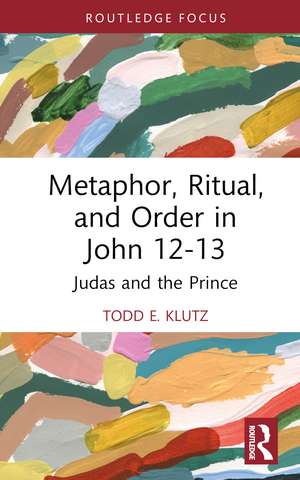Metaphor, Ritual, and Order in John 12-13: Judas and the Prince: Routledge Interdisciplinary Perspectives on Biblical Criticism
Autor Todd E. Klutzen Limba Engleză Hardback – 30 iun 2023
Specifically it explores the meaning of the statement “Now the ruler of this world will be driven out” in John 12:31 and defends a widely overlooked alternative reading. The author proposes a prophecy-fulfilment scheme whereby this predictive utterance by Jesus’ is subsequently implied as fulfilled in the departure of the satanically-possessed Judas’ from the circle of Jesus’ disciples at the Last Supper in John 13:30. Addressing several major strands relating to purity, exorcism, and group identity, the analysis provides an important entry-point for a fresh examination of the Fourth Gospel as a whole. The book represents a significant contribution to Johannine scholarship and to New Testament studies and will be of interest to scholars of religion, theology and biblical studies.
| Toate formatele și edițiile | Preț | Express |
|---|---|---|
| Paperback (1) | 155.43 lei 3-5 săpt. | +17.42 lei 10-14 zile |
| Taylor & Francis – 29 noi 2024 | 155.43 lei 3-5 săpt. | +17.42 lei 10-14 zile |
| Hardback (1) | 388.65 lei 3-5 săpt. | +14.12 lei 10-14 zile |
| Taylor & Francis – 30 iun 2023 | 388.65 lei 3-5 săpt. | +14.12 lei 10-14 zile |
Preț: 388.65 lei
Preț vechi: 422.45 lei
-8% Nou
74.37€ • 77.85$ • 61.53£
Carte disponibilă
Livrare economică 15-29 martie
Livrare express 04-08 martie pentru 24.11 lei
Specificații
ISBN-10: 103239451X
Pagini: 120
Dimensiuni: 138 x 216 x 13 mm
Greutate: 0.26 kg
Ediția:1
Editura: Taylor & Francis
Colecția Routledge
Seria Routledge Interdisciplinary Perspectives on Biblical Criticism
Locul publicării:Oxford, United Kingdom
Public țintă
Academic and PostgraduateRecenzii
Cuprins
2 Metaphor and Exorcism in John 12–13
3 Exorcism, Meal, and Morsel in John 12–13
4 Disorder, Discipline, and Eucharist in John 6–13
5 Conclusion
Notă biografică
Descriere
This book offers new interpretative insight into the Gospel of John, applying a combination of critical discourse analysis, conceptual metaphor theory, and anthropological theories of ritual. Specifically it explores the meaning of the statement "Now the ruler of this world will be driven out" in John 12:31 and defends a widely overlooked alternative reading.
The author proposes a prophecy-fulfilment scheme whereby this predictive utterance by Jesus is subsequently implied as fulfilled in the departure of the satanically-possessed Judas from the circle of Jesus’ disciples at the Last Supper in John 13:30. Addressing several major strands relating to purity, exorcism, and group identity, the analysis provides an important entry-point for a fresh examination of the Fourth Gospel as a whole.
The book represents a significant contribution to Johannine scholarship and to New Testament studies and will be of interest to scholars of religion, theology and biblical studies.














